This healing project takes you deep into Korea to experience traditional Korean and Buddhist culture just for yourself. Taste Korean tradition food through temple cuisine, admire the tranquil architecture and natural surroundings, hear stories passed down through generations, meditate to learn more about yourself, create wish bracelets, and even pray to have your wish granted. Experience Korea's unique temple culture and Buddhist heritage firsthand. This experience will be a valuable opportunity to gain a deeper understanding of Korea.
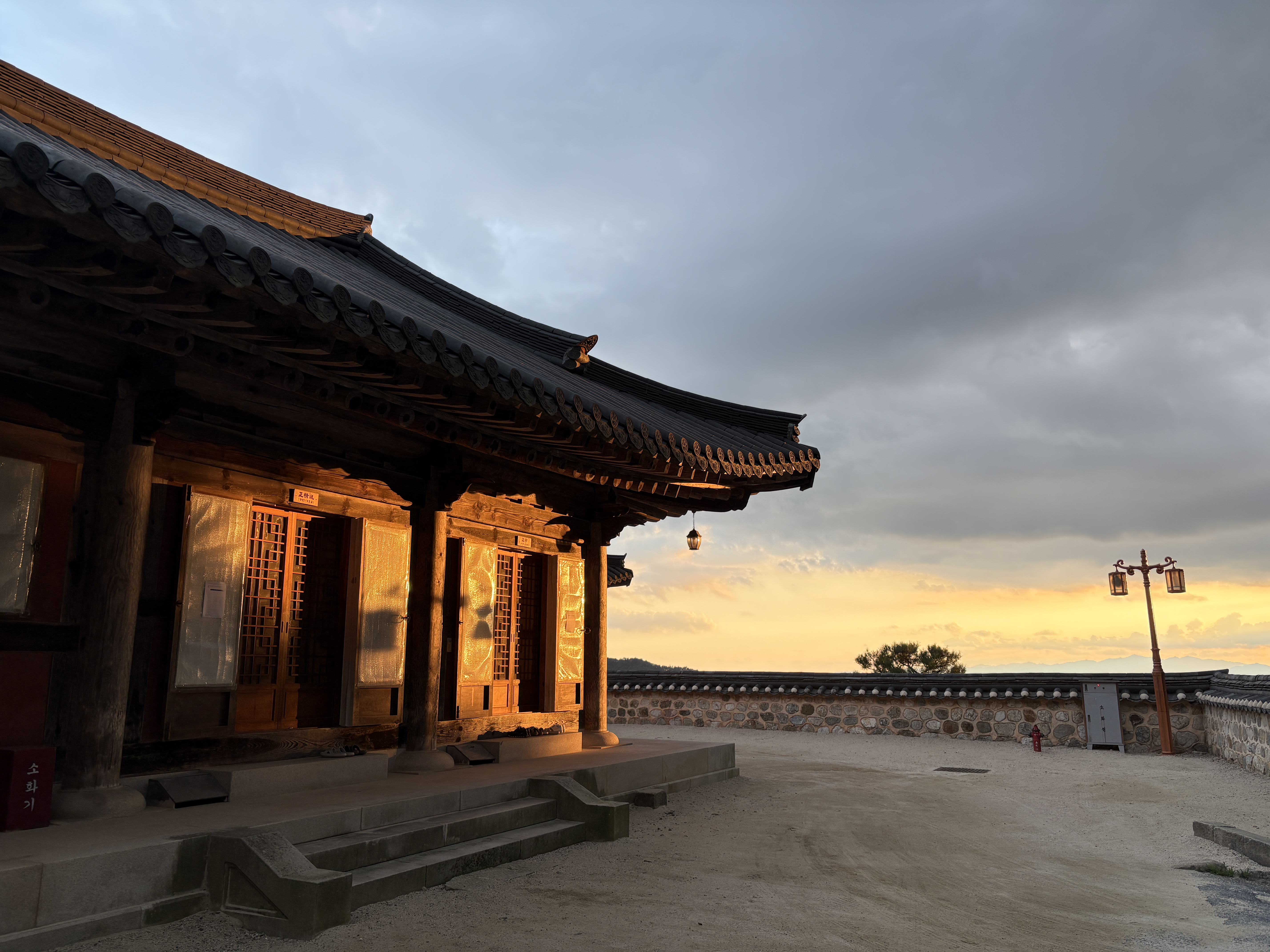
Korean temples are more than just spaces for Buddhist practice. They are traditional sites that have preserved history and culture for over a millennium. They have also been centers of learning, where education, philosophy, and art have flourished, deeply shaping Korean thought and lifestyle. Templestays extend this tradition beyond relaxation, offering a chance to learn about and experience Korea’s oldest cultural aspects. In many ways, temples are “living history textbooks” and the purest places to encounter the essence of Korean life. Additionally, Buddhist statues and other cultural assets are protected as national heritage sites, and the Buddha’s relics enshrined in stone pagodas add even more special value to these sacred spaces.

Temple Stay is a unique program that allows you to experience Buddhist traditions and culture firsthand while staying at a Korean temple. The program begins with meditation, helping you calm your mind and explore self-understanding and reflection. Next, through a traditional meal called Balwoo Gongyang, you learn about moderation, gratitude, and the importance of relationships. Through these practices, you can discover positive influences that profoundly affect your life. Walking, prayer, and other temple activities provide a break from the hectic pace of daily life and help you find inner peace. Sharing tea and conversation in the temple’s natural surroundings heals both body and mind. Temple Stay is not merely a period of rest, it is an opportunity to awaken and learn the art of healing. Let go of the thoughts and habits formed by your busy life and regain your balance. A Korean-style retreat adds a meaningful new dimension to your life. (Legend has it that praying here may even make one wish come true.)

The program begins with a bus ride from Seoul. The journey to the temple is an experience in itself. Along the way, you’ll see Korea’s mountains, fields, charming small towns, and breathtaking scenery—experiences you won’t find in the city. Upon arrival in Bonghwa, you’ll enjoy traditional temple food. Korean temple cuisine offers surprisingly deep and rich flavors, with simple yet unique cooking methods that nourish both body and soul. Additionally, experiencing local life in this region showcases the true essence of Korea. The slow, harmonious lifestyle and daily routines of people living close to nature leave a lasting impression. The journey to Bonghwa and the experiences there are more than just a trip; they are a unique journey into the heart of Korea.
This Korean retreat project allows you to focus on yourself for two days and one night at a quiet temple in the forests of Korea, enjoying the fresh air and natural scenery. Experience a special time to understand Korean traditions and Buddhist culture at a temple steeped in history spanning over a thousand years.
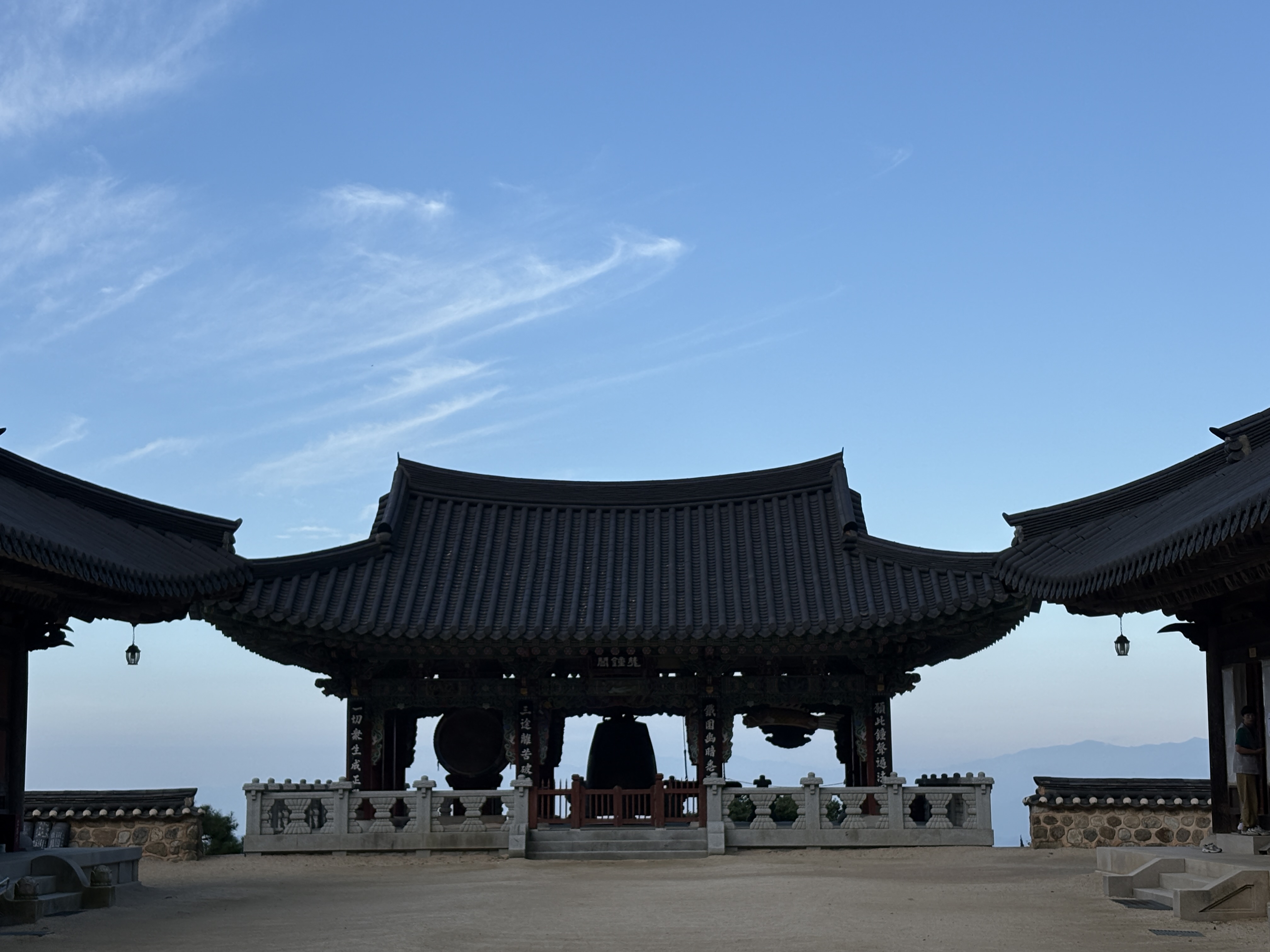
Unique Features of This Project
Make New Friends
Connect naturally with participants from Korea, Europe, Asia, and beyond through meditation, temple walks, and shared temple meals. As you share stories and reflections, you’ll form meaningful, lasting bonds that transcend culture and language.
Explore the Hidden Charms of Korea
Step away from the bustling city of Seoul and discover Korea’s peaceful countryside. Surrounded by mountains and untouched nature, the temple offers a view of Korea’s beauty rarely seen by travelers. Enjoy meals inspired by nature and experience a side of Korea that the city cannot offer.
Relaxation and Self-Reflection
Take time to relax, reflect, and discover a new side of yourself. Meditate and walk in the temple’s tranquil surroundings, calming your mind and reconnecting with your inner balance. This is a rare chance to rest, heal, and focus on personal growth.
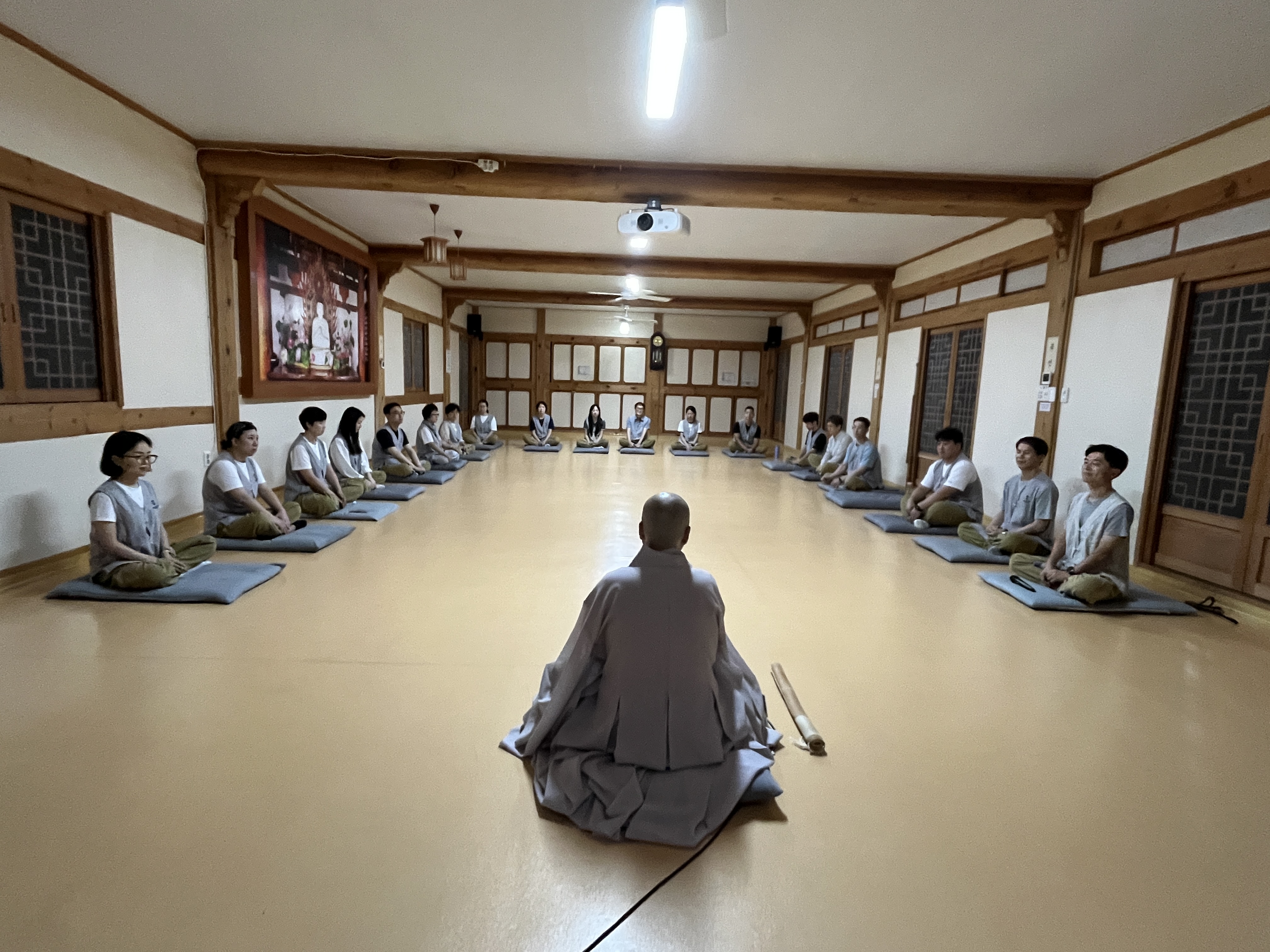
Program Schedule
This program offers a stay at a temple surrounded by beautiful natural scenery and rich history, providing opportunities to learn Zen meditation, practice mindfulness, and engage in self-reflection.
[2 Days 1 Night]
Day 1
| Time | Activity |
| 09:30 ~ 10:00 | Bus boarding |
| 10:00 ~ 15:00 | Travel by bus to the temple |
| 15:00 ~ 16:30 | Arrival, room assignment, and distribution of training clothes |
| 16:30 ~ 17:30 | Temple tour and etiquette briefing |
| 17:30 ~ 18:00 | Dinner |
| 18:00 ~ 19:00 | Rest and bell-ringing experience |
| 19:00 ~ 20:30 | Time with the monks and meditation experience |
| 20:30 ~ 03:00 | Lights out |
Day 2
| Time | Activity |
| 03:00 ~ 03:30 | Wake up and prepare for Buddhist service |
| 03:30 ~ 04:20 | Self-Morning service and 108 bows meditation |
| 04:30 ~ 06:00 | Self-paced meditation |
| 06:00 ~ 06:30 | Breakfast |
| 07:00 ~ 09:00 | Forest meditation walk / Tea talk with monks |
| 09:30 ~ 10:30 | 108 prayer beads experience |
| 10:30 ~ 11:00 | Reflection essay and bus boarding |
| 11:00 ~ 16:00 | Return to Seoul by bus |
* The above schedule is a sample to help you understand the activity. Itinerary may vary depending on local circumstances.
* This project provides transportation from Seoul to the temple. Bus boarding location will be announced at a later date.

Additional Information
- The detailed schedule may change depending on weather and local conditions.
- Please observe temple etiquette.
- Please greet the monks with your hands clasped and a half-bow.
- Please refrain from making loud noises during your stay.
- Drinking, smoking, and bringing in outside food and drinks are prohibited within the temple.
- A lunch break will be provided at a rest stop during the bus ride.
* Participants are free to eat at their own pace at the rest stop.
- Please turn off or silence your cell phones while staying at the temple.
- Do not promote your religion or lifestyle to others.
- Observe the meal times.

General Items for Participants
- Personal toiletries (shampoo, conditioner, body wash), towel, toothbrush, extra clothes, sneakers (comfortable), socks, personal (thermal) water bottle (cup)
*Please bring your own personal items.

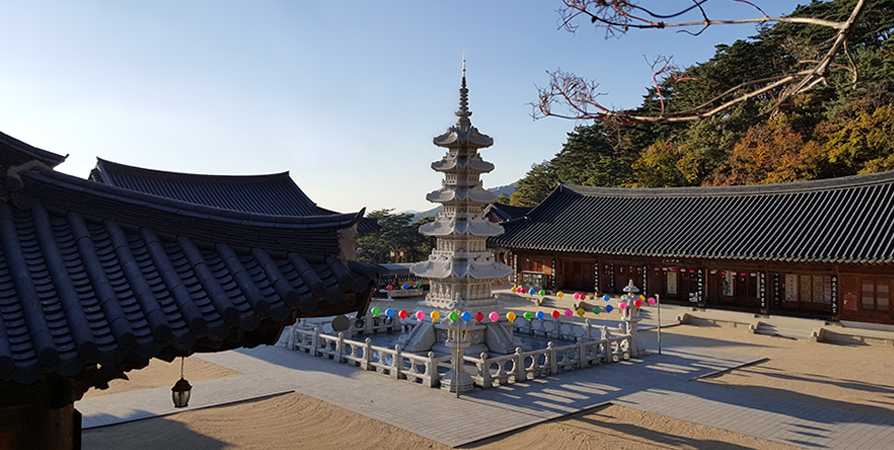
Chukseo Temple, where this project takes place, is located at the foot of Mount Munsusan, and its name means “temple where eagles reside.” In Buddhism, the eagle symbolizes wisdom, and the temple represents the Bodhisattva Myriad, embodying immense wisdom. Founded by the Buddhist monk Uisang in the 13th year of King Munmu’s reign, Chukseo Temple was later used as a battlefield by the Righteous Army, which rose up against Japan following the Japan-Korea Treaty of 1915 and the Treaty of 1916. During a suppression operation, the Japanese military burned down much of the temple, leaving only the main hall. Restoration, including civil engineering and stonework, began in 1996, shaping the temple into its current form. At the center of the temple stands a pagoda enshrining 112 relics of the Buddha, enhancing its spiritual atmosphere. Additionally, the Amitabha Buddha Triad, a unique three-dimensional stone Buddha, serves as a revered place of prayer for many Buddhists.

You will stay in a hanok (traditional Korean house) within the temple grounds, accommodating 2–4 people. The rooms have ondol (heated) floors and come with bedding and futons. Basic amenities are provided, and the shared bathroom and shower facilities offer plenty of hot water for your convenience.
| Location: Bonghwa, Gyeongsangbuk-do
Bonghwa is a healing travel destination where pristine nature and secluded mountain village scenery come together. Nestled at the foot of the Baekdudaegan Mountain Range, Bonghwa’s refreshing air and tranquil forest paths make it the perfect escape from the hustle and bustle of daily life and a place to rest, relax, and recharge.
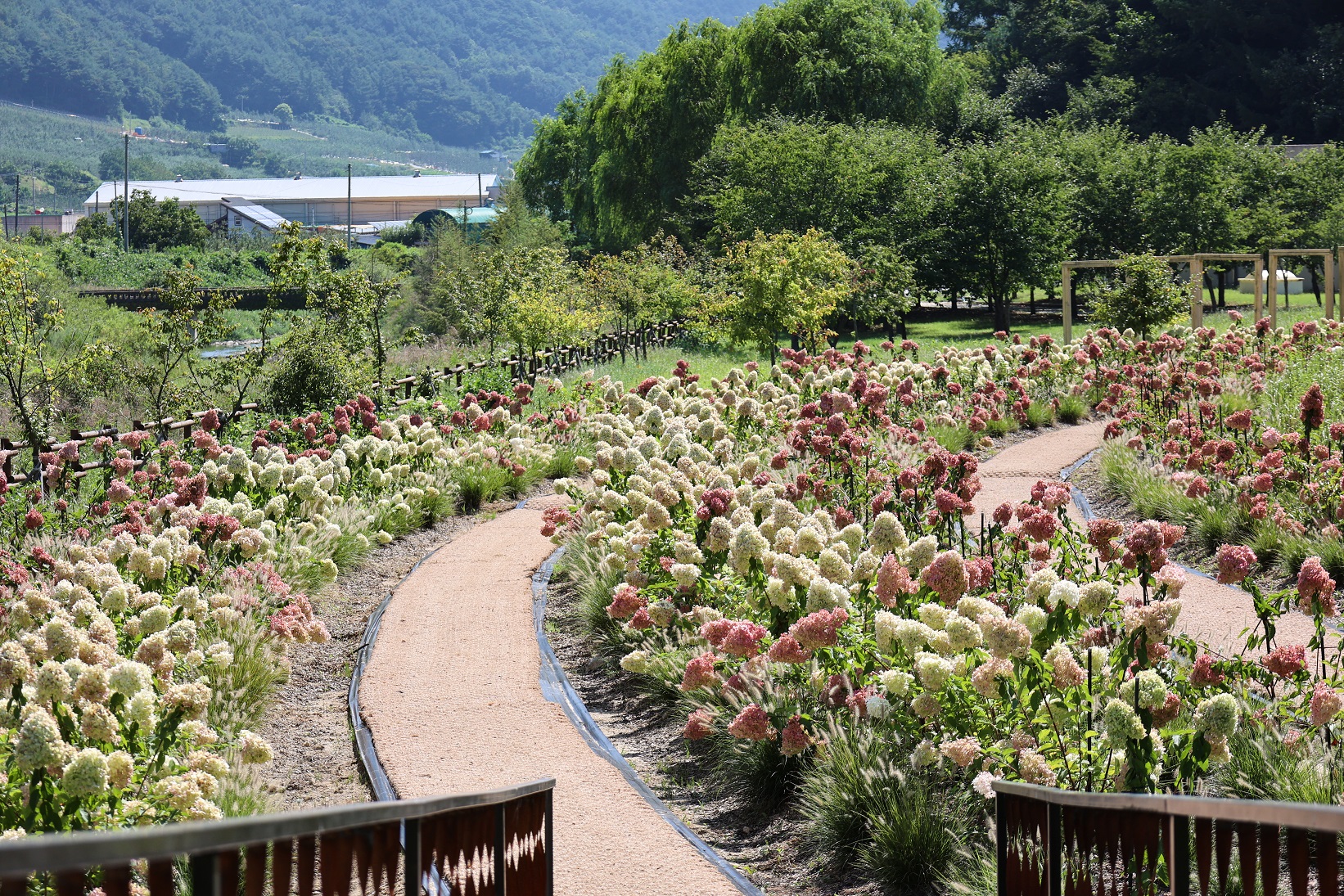
1. Baekdudaegan National Arboretum
This national facility, established for forest conservation and education, features themed gardens, outdoor exhibition spaces, and a biological resource research area. Throughout the year, visitors can see a wide variety of alpine plants, medicinal herbs, and wildflowers, making it an excellent place to learn about nature and explore the surroundings. The arboretum’s architecture and landscaping are also remarkable, and its forest interpretation programs make it a perfect destination for families.

2. Cheongnyangsan Provincial Park
Cheongnyangsan, the most famous mountain in Bonghwa County, is known for its scenic hiking trails, rocky cliffs, and rock formations, as well as the Sky Bridge Observatory. At its peak, the serene Cheongnyangsa Temple stands alongside landmarks such as Eungjinjeon Hall, Kimsaenggul Cave, and Seonyugyo Bridge, offering a blend of natural beauty and cultural experiences. Hiking courses range from one to nine hours, making the park suitable for beginners and experienced hikers alike.
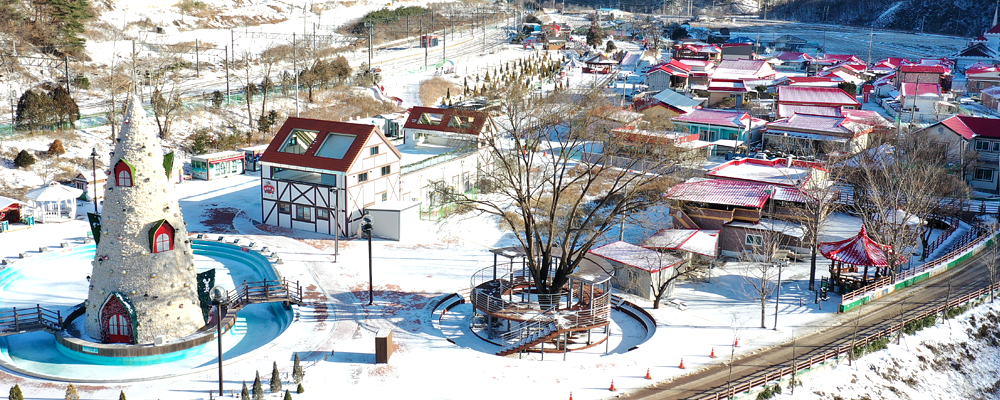
3. Buncheon Santa Village
Buncheon Santa Village is a festive, Santa-themed attraction that comes alive during its winter festival at the end of the year. The V-Train, a scenic train that winds slowly through the Nakdonggang River Valley, offers breathtaking views of the mountains and river. With a variety of activities, including VR experiences and a miniature train ride, the village offers fun for visitors of all ages, from children to adults.
■ Qualifications
- Any foreign adult male or female who loves Korea
- Those interested in traditional Korean culture
- Those interested in Buddhist culture or temple life
- Those with mixed feelings and limited time
- Those who want to experience Korea's beautiful regions
- Those seeking relaxation in a quiet environment